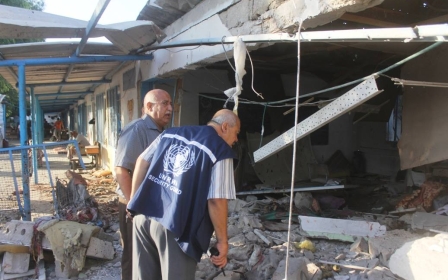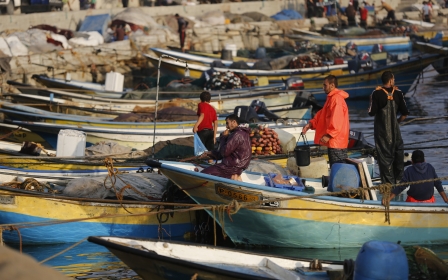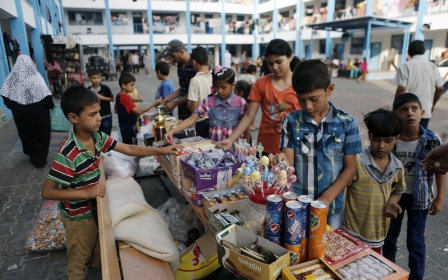The Palestinian fight to be heard ‘down under’

In his 1964 book The Lucky Country, Donald Horne wrote: “Australia is a lucky country run by second-rate people who share its luck.” The phrase was picked up by politicians and used in smug ways Horne never intended. What he meant was that while others had to work hard to get ahead, Australia could ride along on the sheep’s back.
More recently, Australia has ridden the crest of the wave of a mining boom based on Chinese demand for iron ore. This is now tapering off because of a building slowdown in China. What happens when all the minerals are dug up is a question future generations will have to answer, but for the time being Australia remains a lucky country inhabited by people who largely share its luck.
Australia has also ridden on the back of other foreign policies. From the beginning until the 1960s, the back was imperial Britain’s. Endlessly it is repeated that the Australian nation was truly forged at Gallipoli. In fact, what the First World War truly represented in history was the willingness of Australian governments to send young men overseas to fight for the strategic interests of other countries.
The landing at Gallipoli – the “ANZAC tradition” drawing on memories of the Australian New Zealand Army Corps, which was strongly represented in fighting in Turkey - has been exploited ever since to justify Australia’s involvement in foreign wars, even when they are illegal, immoral and sometimes genocidal. The death of young men overseas is the price individual Australians have to pay for “alliances” with powerful “friends”.
While prime minister Robert Menzies’ adulation of Queen Elizabeth seemed genuine enough - once quoting in her presence the words of the 17th century English poet Thomas Ford: “I did but see her passing by and yet I love her till I die” - sycophancy has been the general standard. The low point was Harold Holt’s servile tribute to Lyndon Baines Johnson in 1966: “All the way with LBJ.”
The sucking-up has continued all the way down to Julia Gillard’s starry-eyed speech when prime minister to the US Congress and her overtly sexualized behavior during the visit to Australia of Barack Obama. Like the girl who cannot say no, she gave him what he wanted, a base for US troops in Darwin. The lucky country is also a lackey country, as some have already said, and there is still no sign of adult behavior on the horizon.
Mainstream Australians can be hard to wake up to what is going on outside their own backyard. The good life always beckons, so why spoil it by thinking too much about politics? The backyard literally is the backyard. The suburbs are a world of their own and problems even in one part of Australia have to be exceptional to affect people somewhere else.
Except for scattered remnants, the larrikin bush Australia of Dad and Dave, Ben Bowyang and Chips Rafferty has gone forever. Bureaucratism is rampant in the public and private sector: half the country seems to be engaged in telling the other half what to do. Consumerism, privatization and the destruction of institutions and systems that were once part of the Australian way of life have reinforced these trends.
Unions are a pale shadow of what they used to be. The shifting of political, economic and social parameters has reversed the relationship between the consumer and the corporation or the government department: everything is streamlined to suit the interests of the corporation and not the customer or “client”, whether it be standing in a queue at the bank because not enough tellers are on duty or waiting on the phone for an hour while a call centre in Manila or Mumbai tries to solve a problem with a corporation whose office might be 100 meters down the road.
Everyone has these problems and they frustrate everyone in exactly the same way. Privatisation has reinforced bureaucratization, not relieved Australians of its burdens.
Debate but little dissent
There is little space for dissent in public life. Australians have the freedom to eat and drink as much as they like (or can afford) and can play happily in the sand pit of their own interests forever as long as they don’t get in the way of the political, business and media oligarchs who run the country.
There is debate but real dissent is forced on to the margins, and found there only in limited quantities anyway. The “freedom of the press” is the freedom of the proprietor or the editor to choose who has access and what news and views are fit for Australians to read or hear.
The ability to write lucidly and present a view is not decisive because much of what appears in the media is not lucid or well argued. Politically and socially, Murdoch’s flagship paper, the Australian, plays a malevolent role. Columnists and contributors are toxically right wing: if liberal writers occasionally appear it is only to leaven the mix and produce the chimera of “balance”.
Along with the sell-off by Labor and Liberal governments of what the public used to own is the sell-off of compassion and responsibility, on display in public approval of the callous and vindictive government treatment of some of the most vulnerable people on the face of earth.
Indigenous Australians are now joined on the margins by “boat people” hazarding their lives to get away from wars in Afghanistan and Iraq launched by the U.S. with the enthusiastic support of its Australian “ally”. No connection is made between the bombs dropped on Iraq and the people turning up on Australia’s shores. There is little public compassion and mostly ire at the effrontery of “queue jumpers”. The “fair go” of old Australia has well and truly gone.
In the 19th century the radical libertarian Herbert Spencer coined the phrase “the survival of the fittest”, adapted from Darwin’s studies of evolution but also influenced by Thomas Hobbes’ bleak view of the world as a jungle in which individuals have no altruistic motives.
The rugged individual was the counterpoise to the strength of the collective, playing out ideologically in the struggle between capitalism and communism, politically between the U.S. and the USSR and culturally through the fables of the Old West and the novels of Ayn Rand. In the 1980s, Spencer’s thinking resurfaced in Margaret Thatcher’s remark that “there is no such thing as society” but only the individual: if some people are born with greater advantages than others, then the rest just have to try harder to catch up.
Everywhere the middle class chose to believe what it was being told. Guilt, compassion, moral stirrings and responsibility were lifted from its shoulders. In Australia, the public mood was deformed by the denials of politicians, according to whom aboriginal children were not really stolen from their parents in the 1920s while the “boat people” of recent years really did throw their children overboard.
The Howard, Rudd, Gillard and Abbott governments were only protecting Australia and Australians, so it was believed, by locking up these queue-jumpers and potential terrorists in “detention centres” (razor-wire enclosed internment camps) in the middle of the desert or selling them off to poor neighboring countries. Children could be thrown out of the country in the middle of the night without causing outrage, and “stop the boats” became a race between the government and the opposition to see who could stop the most boats before the next election.
It is in this climate of deliberately induced intolerance that the Palestinian voice has struggled to be heard in Australia.
Voting for the partition of Palestine in 1947, Australia shares the responsibility for the dire consequences of that decision, yet since 1948 its governments have constantly proclaimed their “support” for Israel and its dubious “rights” while refusing to uphold the very real rights of the Palestinians.
Only when Israel’s actions are more than usually outrageous will Australian governments speak up, but even in the most terrible circumstances the criticism is mild: “disproportionate” force when more than 2,000 people have been killed in Gaza and a “blow” to the “peace process” when Israel seizes more Palestinian land and builds more settlements. The present government has gone so far as to accept the Israeli position that the territories seized in 1967 are “disputed” rather than occupied.
Nothing is more disproportionate than mild criticism in the midst of atrocities, and no greater blow has been delivered to the “peace process” than the refusal of Australian and other governments to hold Israel to account of its continuing violations of international law.
Whatever Australian politicians think in private about Israel, their public position is decided not in Canberra but in Washington, just as Washington’s policy is largely shaped in Israel. The Whitlam Labor government of the 1970s tried to introduce more balance but recent prime ministers have been all the way with the U.S., and therefore Israel, as much as Harold Holt was with LBJ.
Rudd was bad but Julia Gillard worse. She curried favor with the Zionists throughout her political career. While describing herself as a strong advocate of women’s and children’s rights, not once did she speak out for the women and children killed during Israel’s onslaughts on Gaza and Lebanon.
With a government calling the occupied territories “disputed” and a media that never permits honest detailed reporting of what Israel does, it is an uphill battle for Palestinian advocates to change public opinion. The media long ago learnt the lesson that to run material too critical of Israel, in the Zionist view, is to trigger off an avalanche of outraged phone calls and emails.
The process is educational. Like Pavlov’s dog, the media has to be taught what to publish and what not to publish, with lessons sometimes having to be repeated because not every student is a good student. Thus when the Sydney Morning Herald recently ran an article and cartoon that outraged and distressed a significant number of members of the “community”- not the broad community at all but a sectional interest group applying all the pressure it could muster - the editor-in-chief quickly backed down and apologized.
The billboard campaigns
The suppression of Palestinian voices continued during Israel’s recent onslaught on Gaza despite the massive destruction and the killing, as mentioned above, of more than 2,000 people, most of them civilians and some 500 children of them children.
Seeking to focus attention on the atrocities being committed, Australians for Palestine advocacy group booked space on a billboard prominently placed close to the centre of Melbourne. The billboard had the image of Nelson Mandela on one side and Archbishop Tutu’s on the other. Their words were quoted: “Our freedom is incomplete without the freedom of the Palestinians” (Mandela) and “Gaza is going to test who believes in the worth of human beings” (Archbishop Tutu). Between the two images a larger text read: “Apartheid. Wrong in South Africa. Wrong in Palestine”.
This was an extension of a larger billboard campaign waged in Canada, the U.S. and South Africa over the past two years. In 2102 the South African Boycott, Divestment and Sanctions (BDS) campaign sponsored a series of “Disappearing Palestine” messages showing the shrinkage of Palestine from 1948 to the present. In 2013 Palestine support groups launched or attempted to launch a billboard campaign based on slight variations of the “Disappearing Palestine” message in 12 North American cities, including Vancouver, Toronto, New York and Los Angeles.
In Vancouver, the Translink transport authority stood up to pressure from Zionist lobbyists that the billboards were a “provocative attack on Jewish people and Israel” and refused to take down the 15 posters in the central bus station, arguing that they were educational and within national advertising guidelines. In Toronto, however, the transport authority rejected the messages on the basis that the authority did not accept that Israel’s confiscation of Palestinian land was either “unfair” or “illegal”, words used on the billboard, thus setting itself against international law.
Similar billboards appeared on commuter platforms in New York and at metro stations in the New York State city of White Plains. New York’s Metropolitan Transport Authority refused to take the billboards down as “it is not our job to censor them”, but in Los Angeles the same company leasing the billboards buckled under pressure and removed the display. Where the billboards could be placed their sponsors reported that the public response was overwhelmingly positive.
In Melbourne, the Palestinian message appeared on one billboard on August 18. Within 48 hours the images and words of Nelson Mandela and Archbishop Tutu had been removed. Writing to Nasser Mashni, representing Australians for Palestine, Peter McClelland, chief financial and operating officer for oOh! Media, the company leasing the advertising space, said a significant number of complaints had been received “from within the community”.
As a result, his company had decided to “suspend” the display pending advice from legal advisers, the Advertising Standards Board and “other authorities”. In the event, judgment was never passed by the Advertising Standards Board or any other authority, legal or otherwise. The display was never put back: it was replaced by an advertisement for beer and oOh! Media subsequently terminated its contract with Australians for Palestine. Once again, “community standards” had prevailed.
The media was either relatively disinterested or suspicious. Radio talkback host Tom Elliott asked Samah Sabawi, the very articulate advocate for Australians for Palestine: “Do you see yourself as a Palestinian or an Australian?” Such a question would never be asked of a Jewish supporter of the state of Israel. The accusations of anti-semitism would pour in.
This was followed by: “Are you one of the people responsible for this billboard?”, as if Australians for Palestine was somehow breaking the law; and then by his remark that: “We have had a number of Israeli Australians call us to say that Arab-Israelis have equal rights.” This line was reinforced by the Zionist Federation of Australia and the Zionist Council of Victoria, whose spokesmen said: “Israel has for decades actively attempted to bring self-determination for Palestinians despite the best efforts of Hamas and other terrorists.”
This suppression of Palestinian opinion during the assault on Gaza was not an isolated event. In South Australia, the Australian Friends of Palestine Association booked electronic advertising space around the boundary at Adelaide Oval. The original message to be shown over 30 seconds would have read “Free Palestine. Free Gaza. Donate now www.afopa.com.au”, but this was rejected by the Adelaide Football Club as being a political statement.
The replacement wording “Help the children of Palestine”, was accepted by the club but rejected by the top Australian football body, the Australian Football League, on the grounds that it was making a “political statement” apparently by the mere use of the word Palestine.
The absurdity of this situation was drawn out in a radio interview on Adelaide Radio Five AA. The host, Leon Byner, interviewed the person paying for the advertisement, restaurant owner Daniel Milky, along with the chairman of the Australian Friends of Palestine Association and an “expert” in international affairs, Dr John Bruni, of Sage International (a company which it says “provides high-end geopolitical analysis, risk assessment and knowledge on contemporary security issues). In his view, by placing the advertisement “you are recognizing an entity called Palestine”. Even saying “help the children of Gaza” would be highly contentious. Bryner raised the obvious question of how to help children in distress without saying where they were.
Saving children was also the theme picked up by Elie Wiesel and Rabbi Shmuley Boteach but with a vicious twist. Lodged with leading U.S. papers at the height of the Gaza campaign, and appearing in the UK’s Guardian (but rejected by The Times), the headline over their advertisement read: “Jews rejected child sacrifice 3,500 years ago. Now it’s Hamas’ turn.”
In the text, Wiesel accused Hamas of using children as human shields, in other words sacrificing them, just as the Bible says Canaanites sacrificed children to the idol Moloch. The combination of an outright lie - there was absolutely no evidence of Palestinians using their children as human shields, against the abundance of evidence showing that this is exactly what Israeli soldiers have done - with blood libel and slander was completely monstrous and would be unthinkable if Israel were the target.
Boteach went further by calling Israel “the supreme embodiment of Jewish values”. That he spoke for no one but himself was made clear by the involvement of Jews in the billboard campaigns and protests around the world by Jews, including Holocaust survivors, against the attack on Gaza.
Wiesel’s accusation was reminiscent of Israeli prime minister Golda Meir’s remarks in the 1970s that “We can forgive the Arabs for killing our children but we can never forgive them for forcing us to kill their children”, and that “Peace will come when the Arabs love their children more than they hate us”.
Suppression in the arts
It is not just in the media but in the arts where “Palestine” has to be proscribed. In 2011 Melbourne artist Van Thanh Rudd entered a work entitled Pop Goes the System in the Human Rights and Film Festival. To be shown at the No Vacancy gallery during May 12-27, one side of his canvas showed cartoon characters exploding with the people power of the “Arab Spring”. The other showed Justin Bieber spray-painting the logo of the Max Brenner food and chocolate chain on Israel’s separation wall in support of the BDS campaign.
Brenner is a subsidiary of the Strauss Group, an Israeli food company, which under the heading of “corporate responsibility” gives food and “care packages” to the Israeli military’s Golani Brigade. The organizers of the festival said the Bieber side of the canvas incited racism, violence and division. Were they not aware of the irony in calling an art work divisive when it depicted one of the greatest symbols of division in the world?
In 2004 a work of art with an “anti-Israel text” superimposed over the Star of David was removed from a shop-front in central Melbourne after a “flood of complaints” from “Jewish groups” and threats of vandalism. The guardians of “community standards” were outraged, especially at the use of public money to fund such an exhibition.
Melbourne City Council’s chief arts bureaucrat, Kimberley Kitching, dismissed the artwork as “low grade political propaganda”, by which standard Picasso’s Guernica would have been removed from the Museo National Centro de Arte Reina Sofia in Madrid and stored in the basement a long time ago. The curator of the exhibition apologized to the city council and sponsors for not notifying them of “potential controversy”.
The lessons for artists who want to draw water from the same fountain as politicians or city councillors planning their next free trip to Europe to study town planning or traffic flows in the south of France is to make sure their works meet “community standards”. If they do, of course, art will eventually be brought to a standstill.
One case further back overlaps the arts and media. This was Michael Leunig’s 2002 cartoon showing two figures side by side, one a Jew standing at the gates of Auschwitz and another a Jew with a gun standing between Israel and Gaza. Leunig has an extraordinary knack for putting his finger on the unspoken whether in political life or the life of the individual, and Australians love him for it, but here he was tampering with the sacrosanct.
Michael Gawenda, the editor of the Age newspaper, and himself Jewish, believed that the cartoon was “inappropriate” and that anyone seeing it would also think it was inappropriate. So he banned publication before anyone had the chance to see the cartoon and decide for themselves.
Finally, when Hanan Ashrawi came to Sydney in 2003 to receive the Sydney Peace Prize, the Zionist lobby, backed by the mayor of Sydney, Lucy Turnbull, made the most strenuous but ultimately unsuccessful effort to stop her getting it. Sydney Morning Herald columnist Mike Carlton remarked that “there were a lot of Jewish people in Sydney, very, very, very angry about this … they flooded the phone lines and the e-mail traffic for a while”. Eleven years later, in 2014, Carlton was squeezed out of his job when he resigned rather than grovel by apologizing to readers incensed by an article on the Gaza attack in which he used the word genocidal.
The acts of censorship come out of a long history in Australia of government and media support for Israel’s oppression of the native people of Palestine. The binary divide between support for Israel in Australia and other colonial settler states and opposition to Israel elsewhere seems too glaring to be coincidental.
There are parallels between Palestinian history and the history of the land that came to be called Australia. May 14, 1948, “independence day” for the Zionists, began the Palestinian nakba (“catastrophe”). The landing of the first white settlers at Botany Bay on January 26, 1788, “Australia Day” for white Australians, was no less a nakba for the indigenous people.
The Zionists celebrate what the Palestinians mourn just as white Australians celebrate what aboriginal Australians mourn. Of its nature, Palestinian history invites people to look at their own history and that is something people in countries whose origins are similar to Israel’s are not always going to be comfortable with
- Jeremy Salt is a former journalist, turned academic. He is based in the Department of Political Science and Public Administration, Bilkent University, Ankara where he teaches courses in modern Middle Eastern history and propaganda. His most recent book is The Unmaking of the Middle East. A History of Western Disorder in Arab Lands (Berkeley: University of California Press, 2008.)
This views expressed in this article belong to the author and do not necessarily reflect the editorial policy of Middle East Eye.
Photo Credit: Protesters hold banners and flags as they march in Sydney against Israel's military campaign in Gaza (AFP)
New MEE newsletter: Jerusalem Dispatch
Sign up to get the latest insights and analysis on Israel-Palestine, alongside Turkey Unpacked and other MEE newsletters
Middle East Eye delivers independent and unrivalled coverage and analysis of the Middle East, North Africa and beyond. To learn more about republishing this content and the associated fees, please fill out this form. More about MEE can be found here.





